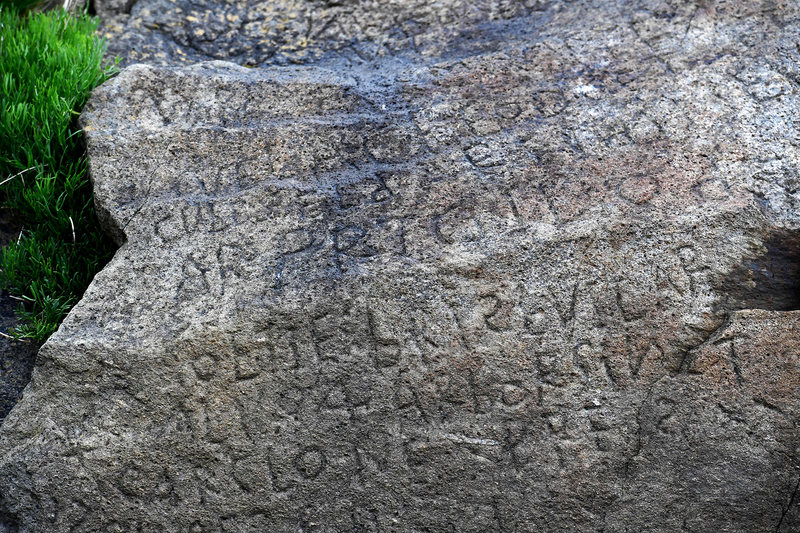The "riddle of the rock"
« previous post | next post »
Hugh Schofield, "France asks: Can you solve the riddle of the rock?", BBC News 5/10/2019:
A village in western France is offering a €2,000 (£1,726) prize for help in deciphering a 230-year-old inscription found on a rock on a remote beach.
Until now no-one has been able to make out the meaning of the 20 lines of writing, discovered a few years ago.
The metre-high slab is in a cove accessible only at low tide near the Brittany village of Plougastel.
Despite the fairly wide coverage, I haven't been able to find any decent pictures of the inscriptions — maybe a reader can point us to some.

Ian Preston said,
May 19, 2019 @ 7:27 am
There are some informative pictures here and an attempted transcription here.
[(myl) Thanks!]
Stephen Goranson said,
May 19, 2019 @ 8:02 am
Via google news there are a few other photos, though no really good ones, nor a good drawing nor full provisional transcription, at least that I noticed.
One page makes a possibly important remark, if true: that there are other similar inscriptions nearby:
"En fait il ne s'agit pas d'un seul rocher gravé : plusieurs blocs autour du rocher principal portent des inscriptions qui semblent du même auteur"
https://www.hitwest.com/news/enigme-a-plougastel-33609
Jerry Friedman said,
May 19, 2019 @ 10:13 am
According to the article, you get photographs if you register at the "mayor's administration". It doesn't say how to register.
Jerry Friedman said,
May 19, 2019 @ 10:26 am
But I see that the blog post linked in the blog post linked by Ian Preston has the address: veronique.martin@mairie-plougastel.fr
LF said,
May 19, 2019 @ 1:12 pm
There are some photos here (with a bonus Voynich link):
http://ciphermysteries.com/2019/05/13/plougastel-inscription-photographs
Rodger C said,
May 20, 2019 @ 8:10 am
How far is the Brittany village from the France capital?
Frédéric Grosshans said,
May 20, 2019 @ 9:03 am
@Rodger C : Something like 580 km, or almost six hours driving. The Google map link is here, if you want to know where it is https://goo.gl/maps/aHk1WYmtm5qPawic9
Rodger C said,
May 20, 2019 @ 10:48 am
Thank you Frédéric. I was making a small joke at the expense of American journalistic language.
Bill Taylor said,
May 20, 2019 @ 11:34 am
I do notice this (using the name of the place rather than the adjective form) fairly often in U.S. writing, but in this case I think it was British journalistic language. Maybe the author thought readers wouldn't understand where Plougastel is if it was called a Breton village?
Aelfric said,
May 20, 2019 @ 12:12 pm
Rodger C — while I am perfectly happy to point out American peccadilloes, I don't think BBC articles fit that particular bill!
Rodger C said,
May 20, 2019 @ 7:48 pm
Oh.
Chandra said,
May 21, 2019 @ 3:55 pm
No idea about the stone writing, but I find the sentence "Until now no-one has been able to make out the meaning of the 20 lines of writing" odd in this context, as to me "until now" suggests that someone has now deciphered it. I would have used "so far".
JB said,
May 21, 2019 @ 10:16 pm
Curious how all the sources date the carvings back to the 1780s solely on the basis of the carvings themselves, and not other documentary evidence. I wonder when they first discovered.
It is worth pointing out that that area was the scene of heavy resistance activity during WW2, although I do not think it is military code of some sort…
TIC said,
May 26, 2019 @ 6:57 am
A bit late and a bit off topic (I hope the former does a bit to palliate the latter) but can anyone point me to any discussion of what seems to be a shift over the years in AmE (including but not limited to journalism) from, as Roger C noted, the use of place-name-based adjectives to place-name nouns in such instances?…